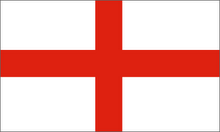My regular reader will probably know that I am something of a history buff; not quite in Ana's league, I would happily concede; more of an enthusiastic amateur with an abiding interest in the history of medieval England, which is why this story from last Friday's Times (I've been a bit busy lately!) caught my eye.
I'm sure many of you will have read or heard about the new research, suggesting that the Battle of Bosworth Field, fought in 1485, actually took place a couple of miles from the location in which it was previously believed to have occurred.
So far, so good: despite the fact that the battlefield visitor centre was built in the 'wrong' place, it is still close enough to be of service and in some ways, doesn't actually sully the ground on which our last Plantagenet king, Richard III, lost his life and his crown to the future Henry VII.
But what I found particularly thought provoking about Ben Hoyle's article (I can only assume he is not an historian -he is billed as the paper's Arts correspondent) is the content of this paragraph:
In those few frenzied moments the future of England — and by extension much of the world — changed course. Bosworth became the bridge that links the Middle Ages to modern Britain and ushered in the dynasty of Henry VIII and Elizabeth I. If Richard had killed Henry there might have been no English Reformation, no Church of England and no Elizabethan golden age to inspire artists, explorers and empire builders.
Yes, in those few moments, the future of England changed; the dynasty that had provide the country with fourteen kings in an unbroken chain from 1154 until that moment, was unseated and a new one, the Tudors, took their throne; that much is unarguable. It is the suggestion of inevitability contained in the sentence "If Richard had killed Henry there might have been no English Reformation and no Elizabethan golden age to inspire artists, explorers and empire builders."
Did Richard's defeat, deposition and death really inevitably lead to those eventualities? Or, is all history - including this section of it - essentially the outcome of a series of sometimes random, often unplanned and unforeseeable events?
Let me use the accession of the Tudors and their developing history to illustrate my point.
As many of you will know, the future Henry VIII was not his father's eldest son and was not, therefore, born to be king. That role initially went to his elder brother, Arthur, Prince of Wales, who died aged only fifteen in 1502, seven years before his father. Arthur was (famously and subsequently) married to Catherine of Aragon, who was to become his younger brother Henry's wife after his death.
Imagine, as was entirely possible, that Arthur had lived to maturity and that he and Catherine had produced children. The man we now know as Henry VIII would never have become king and would have been known to history as a mere royal duke; a footnote at the bottom of a page.
Continuing that thought process, had Arthur not died prematurely and he and Catherine had produced children, there would have been no split with Rome (at least when it actually happened), England would have remained as it had hitherto always been: firmly and devoutly Roman Catholic and the Dissolution of the Monasteries may have been unheard of even today.
So much for inevitability.
But Arthur did die, Henry did become king and went on to marry his brother's widow. Their union was blessed with only one surviving child, Mary (the future Mary I); but the couple also had a son, Henry, Duke of Cornwall, who catastrophically died aged less than two months in 1511.
Returning to the concepts of randomness versus inevitability, what if baby Henry had lived to become Henry IX of England? Given his obsession with securing a male heir, the very obsession which subsequently led to his divorce from Catherine and his cataclysmc split with Rome, is it not entirely likely that Henry VIII would have remained happily married to his first queen, as his son and heir grew up, married and had children himself?
Such an eventuality would have meant that Anne Boleyn may have never graced the pages of our national history, other than possibly becoming Countess of Northumberland. A similarly anonymous fate would have befallen Jane Seymour and as a consequence, neither the future Edward VI or, crucially, Elizabeth I, would have been born, still less occupy the Throne in their own rights.
I could go on; what if Mary had not died without issue from her marriage to Philip of Spain, what if Edward VI had lived to adulthood and had children - both eventualities would have meant that Elizabeth would never have ascended the Throne; but I think my point is made.
There is nothing inevitable about the course history takes; it is entirely random and subject to the vagaries of life, death and even human fertility.
I'm sure Ben Hoyle was only using his assertion as a convenient journalistic vehicle in order to illustrate the importance of the discovery of the real Bosorth Field and I am grateful to him for doing so, for prompting me to write this post.
By the way, can anyone else spot any similarities between this related story, also written by Ben Hoyle and published in the Times in September 2009 and the one which I link to above?
Cut and paste journalism in the Times? Perish the thought...
Saturday, February 20, 2010
The Battle of Bosworth Field and inevitability...
Labels:
cause and effect,
England,
English history,
guesswork,
History,
journalism,
monarchy,
Opinion pieces,
randomness
Subscribe to:
Post Comments (Atom)








No comments:
Post a Comment